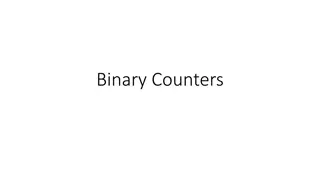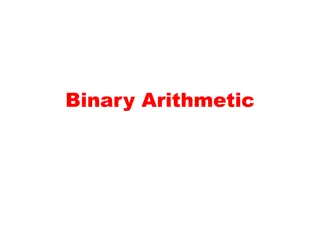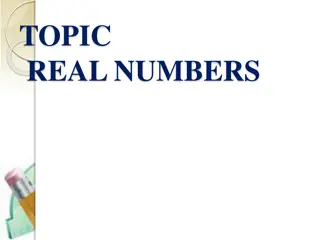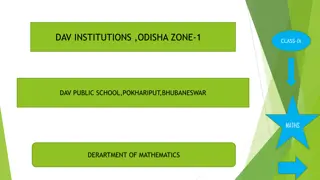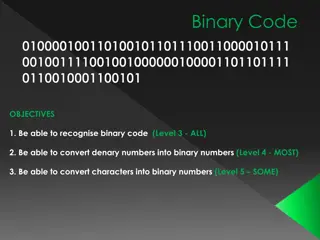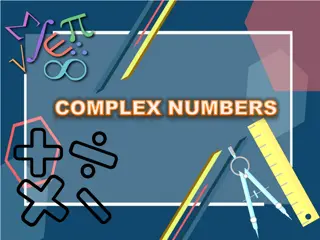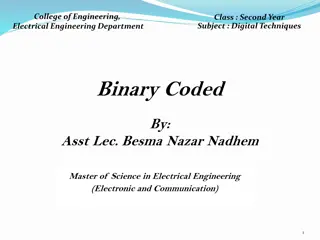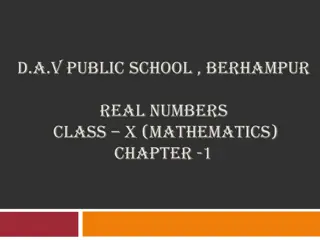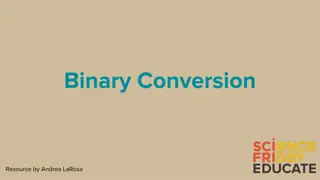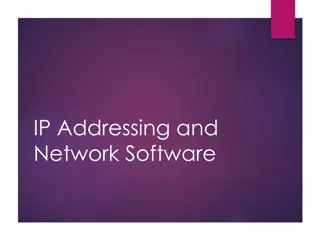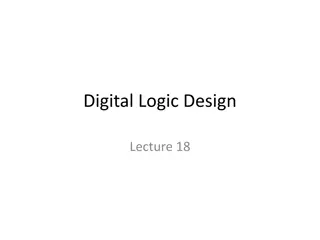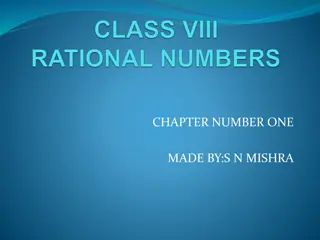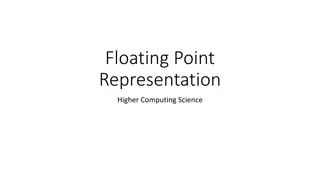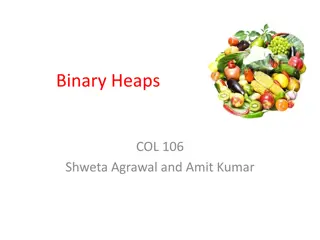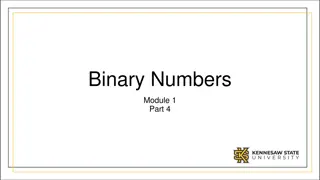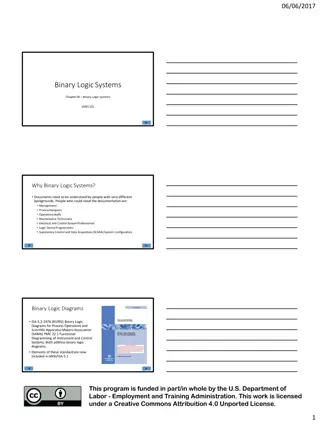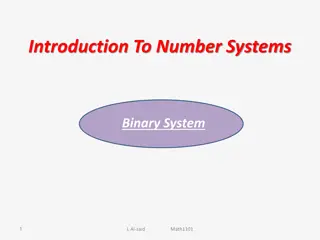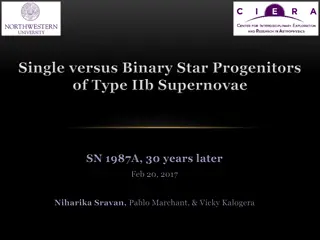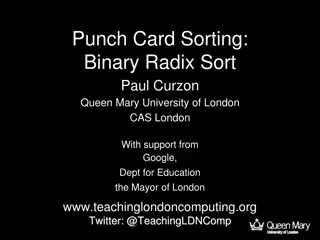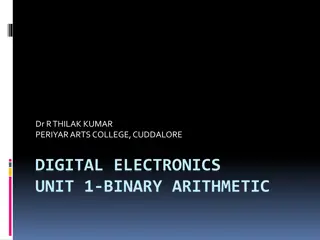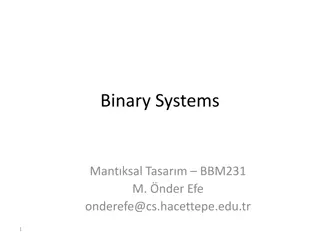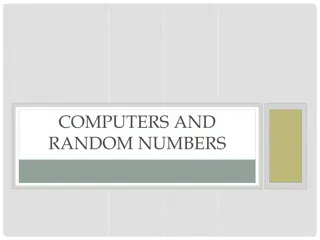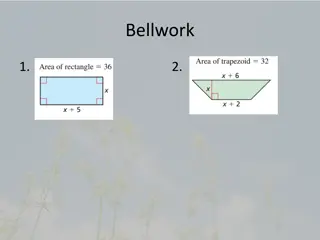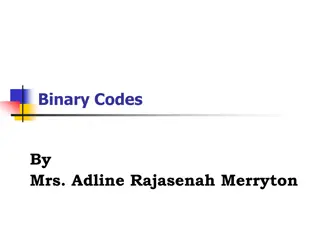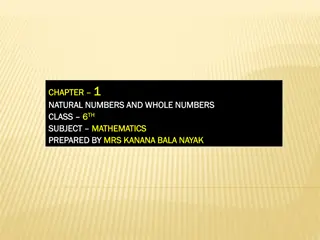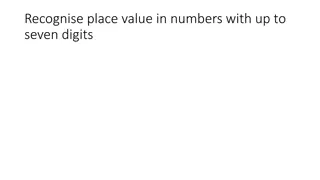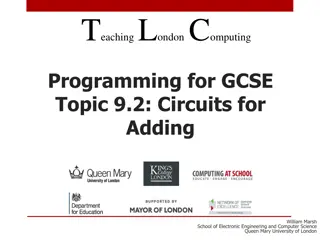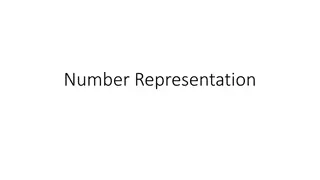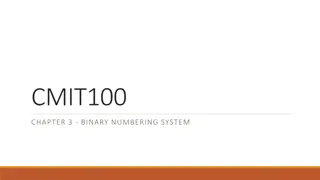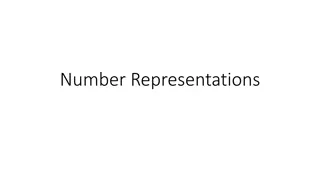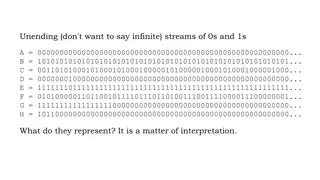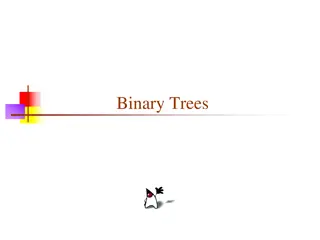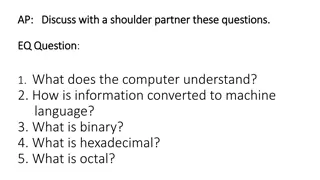Understanding Binary Codes and Their Applications
Binary coding is crucial for digital systems as they understand only 0s and 1s. This process converts information into binary language for processing by digital circuits. Different types of binary codes like weighted codes and BCD codes are used for error correction, digital communication, and compu
7 views • 20 slides
Understanding Binary Counters and Types of Counters
Binary counters are registers used to count clock pulses, while binary counters follow the binary number sequence. There are two types of counters: serial/asynchronous counters and parallel/synchronous counters. Serial counters change output flip-flop to next flip-flop, requiring minimal hardware bu
12 views • 21 slides
Understanding Non-Weighted Codes and Excess-3 Code in Binary Systems
Explore non-weighted binary codes like Excess-3 code, learn how to convert decimal numbers to XS-3 code, advantages and disadvantages of BCD codes, and steps to convert Excess-3 code to binary. Discover the intricacies of binary coding systems with practical examples.
5 views • 55 slides
Understanding Binary Number System and its Applications
Explore the world of binary numbers with insights on what binary is, its significance in computing, conversion methods between binary and decimal, hexadecimal number system, and binary arithmetic operations. Dive into the foundations of digital communication through the language of zeros and ones.
0 views • 24 slides
Binary Arithmetic
Explore the world of binary arithmetic, including addition, subtraction, multiplication, and division. Learn the rules and examples of performing basic binary operations efficiently. Understand how to convert binary numbers to decimal equivalents. Enhance your understanding with visual explanations
0 views • 51 slides
Exploring Real Numbers and Number Systems
Dive into the world of real numbers with topics ranging from the definition of real numbers to Euclid's Division Algorithm and the Fundamental Theorem of Arithmetic. Discover the properties of rational and irrational numbers, learn to find the highest common factor (HCF) and least common multiple (L
0 views • 37 slides
Understanding Rational and Irrational Numbers in Mathematics
Explore the concept of rational and irrational numbers in mathematics through defining, distinguishing, computing, representing, and rationalizing these types of numbers. Learn about natural numbers, whole numbers, integers, rational numbers, and irrational numbers with clear examples. Answer common
1 views • 48 slides
Understanding Binary Code and its Conversion
Computers rely on binary code, consisting of 0s and 1s, to communicate. Learn how to recognize, convert denary numbers to binary, and understand the basics of the computer language. Discover how to create a table for conversion and practice converting numbers to binary in this informative guide.
1 views • 26 slides
Comprehensive Guide to Complex Numbers - Learning Objectives, Key Concepts, and Previous Knowledge Testing
This comprehensive guide provides detailed information on complex numbers, including learning objectives such as identifying complex numbers, applying algebra, understanding properties like conjugates and moduli, finding square roots, and representing in polar form. Key concepts covered include inte
3 views • 27 slides
Understanding Binary Codes and Self-Complementing Codes
The concept of binary codes, including Binary Coded Decimal (BCD) codes, and self-complementing codes is explored in this informative content. Learn about how decimal numbers are represented in binary form, the structure of BCD codes, and the properties of self-complementing codes like 2421 and Exce
2 views • 34 slides
Understanding Binary Coded Decimal (BCD) and Excess-3 Code
Binary Coded Decimal (BCD) is a binary code used to represent decimal numbers, with the popular 8421 BCD code and its conversion process explained. Additionally, Excess-3 Code, another BCD code, is detailed with an example of finding its code for a given decimal number. Different BCD codes like 4221
0 views • 11 slides
Real Numbers: Classification, Operations, and Examples
Real numbers encompass a wide range of mathematical entities, including natural numbers, whole numbers, integers, fractions, rational numbers, and irrational numbers. This chapter delves into the classification of real numbers, Euclid's Division Lemma and Algorithm, finding HCF and LCM using these m
4 views • 15 slides
Understanding Binary Code and Color Conversion
Delve into the fascinating world of binary code and learn how it works to represent data digitally. Discover the process of decoding binary pulses into colored pixels, using binary sequences to identify colors, and practicing digital-analog conversion through logic maps. Explore the language of bina
0 views • 20 slides
Recover Lost Funds From Binary Options Fraud Brokers
Are you a victim of a binary options fraud? You can fight back and recover your funds. Report to MychargeBack today! We have helped thousand of binary options fraud victims to get their money back. You can get your funds back from binary options scam
0 views • 15 slides
Understanding IP Addressing and Conversion from Binary to Decimal
Learn about IP addressing, including binary notation, dotted-decimal notation, and the process of converting binary numbers to decimal. Explore the unique features of IP addresses and the steps involved in converting binary to decimal systematically.
4 views • 47 slides
Understanding Digital Logic Design Fundamentals
Delve into the intricate world of digital logic design with a focus on components like binary adders, subtracters, and comparators. Explore the concept of scale of integration and learn about MSI components and the realization of full binary adders. Discover how to simplify circuits and grapple with
0 views • 32 slides
Understanding Rational Numbers: A Comprehensive Overview
Discover the world of numbers with this comprehensive guide on different types of numbers, focusing on rational numbers. Learn about natural numbers, whole numbers, integers, and how rational numbers are represented on a number line. Dive into the properties of rational numbers and explore the conce
2 views • 19 slides
Understanding Prime Numbers and Greatest Common Divisors in Discrete Structures
Cryptography relies on prime numbers and the fundamental theorem of arithmetic to ensure security. We explore the concept of prime numbers, composite numbers, and how to test for primality using trial division. The Fundamental Theorem of Arithmetic establishes that every integer can be uniquely fact
1 views • 44 slides
Understanding Floating Point Representation in Binary Systems
In computer systems, decimal numbers are represented in memory using scientific notation. This involves moving the decimal point and using mantissa and exponent to maintain precision and range. The transition to representing numbers in binary involves multiplying by 2 to the power instead of 10. Uti
2 views • 22 slides
Understanding Binary Heaps: Efficient Data Structure for Priority Queue Operations
Explore the concept of binary heaps, a specialized type of binary tree that allows for quick retrieval of the smallest (or largest) element. Learn how binary heaps excel in finding the minimum value, essential for priority queue applications in operating systems, event simulations, and more. Compare
2 views • 34 slides
Understanding Binary and Decimal Number Systems
This content explores the basics of binary and decimal number systems in a simple and engaging manner. It starts with decimal numbers, explaining how our numbering system works and progresses to binary numbers, which have only 2 digits (0 and 1). The significance of these systems in computing and ho
0 views • 27 slides
Understanding Binary Logic Systems in Documentation
Binary logic systems play a crucial role in documentation for individuals with diverse backgrounds such as management, process designers, operations staff, maintenance technicians, and more. These systems, depicted in binary logic diagrams, provide a clear and concise representation for various prof
4 views • 16 slides
Understanding Number Representations and Floating-point Numbers in Computer Science
Exploring the conversion of integers to binary, including the 2's complement method for negative numbers. The concept of fractions in binary and the representation of floating-point numbers in single and double precision formats are also discussed. Special cases like denormalized numbers, infinity,
0 views • 28 slides
Exploring the Binary Number System in Mathematics
Delve into the intricacies of the binary number system with this comprehensive guide. Learn how binary numbers are formed, and master the conversion techniques between binary and decimal numbers. Discover the fascinating world of binary fractions and the algorithms for converting decimal numbers to
0 views • 20 slides
Unveiling the Progenitors of Stripped Envelope Supernovae (SNe)
The mechanism behind the stripping of stripped-envelope SNe remains a key question linked to their progenitors. Various mechanisms such as Single Star Progenitors, Binary Star Progenitors, Stellar Winds, and Close Binary Interactions are thought to dominate the stripping process. Observations of Typ
0 views • 12 slides
Understanding Binary Radix Sort for Efficient Data Sorting
Explore the concept of Binary Radix Sort explained through sorting punch cards into order with a pencil. Learn how to efficiently sort data using divide and conquer techniques based on binary numbers. Discover the practical ways to teach computing and computational thinking without relying on comput
0 views • 13 slides
Introduction to Binary Arithmetic for Digital Electronics
Binary arithmetic is fundamental in digital electronics, involving addition, subtraction, and multiplication of binary numbers. This guide explains the rules and examples of binary arithmetic operations, such as binary addition and subtraction, along with detailed steps and illustrations for better
0 views • 21 slides
Understanding Binary and Numeric Systems in Computing
Delve into the world of binary systems, binary numbers, base conversions, powers of 2, arithmetic operations with binary and octal numbers, and multiplication principles in computing. Learn how to compute values and conversions in various number systems efficiently.
0 views • 41 slides
Understanding Random Numbers in Computers
Explore the concept of true random numbers versus pseudorandom numbers in computers. Learn how pseudorandom numbers are generated algorithmically but predictable, while true random numbers are derived from physical phenomena like radioactive decay. Discover the relevance of high-entropy pseudorandom
0 views • 57 slides
Understanding Complex Numbers in Mathematics
Learn about complex numbers, including real and imaginary parts, operations with complex numbers, the imaginary unit, equality of complex numbers, and finding square roots of negative numbers. Explore how to define and use the imaginary unit, add, subtract, and multiply complex numbers, find complex
0 views • 17 slides
Understanding Binary Codes and Character Coding Techniques
Binary codes, such as ASCII and EBCDIC, are crucial in representing data in computers and digital systems. They play a key role in error detection and data encoding. This article discusses the basics of binary coding, various types of binary codes, character coding techniques like ASCII and EBCDIC,
0 views • 22 slides
Understanding Natural Numbers, Whole Numbers, and Roman Numerals
This chapter delves into the concepts of natural numbers, whole numbers, and Roman numerals. It covers the basics of numeral systems, properties of whole numbers, and rules for Roman numerals. Learn about counting numbers, place value, successors, predecessors, and more to build a strong mathematica
0 views • 11 slides
Understanding Place Value and Number Magnitudes
Explore the concept of place value in numbers up to seven digits, learn how to write numbers in figures, identify digit values, find the largest and smallest numbers, order numbers, and work on rounding and comparisons. Engage in exercises like recognizing digits, writing numbers in figures, circlin
0 views • 61 slides
Understanding Binary Addition Circuits in Computing
Explore the concepts of half adders, full adders, and binary addition circuits used in computer systems. Learn how binary digits are represented as logic levels to perform addition operations. Dive into the working principles of half adders, truth tables, formulas, and circuit diagrams for binary ad
0 views • 15 slides
Understanding Number Representation and Conversion
Learn how to convert between decimal and binary number representations. Discover the process from decimal to binary by dividing repeatedly by 2, and from binary to decimal by summing the powers of 2. Explore the simplicity of converting between base 16 and base 2, and practice binary addition with e
0 views • 27 slides
Understanding Binary Numbering Systems and Character Representation in Computing
Explore the world of numbering systems including decimal, binary, octal, and hexadecimal, and delve into how characters are stored in computer memory. Learn about Boolean operations and their application on binary numbers, with a focus on IP addresses. Discover the importance of ASCII, Unicode, and
0 views • 26 slides
Understanding Binary Representation of Numbers with Fractions
Learn how to represent numbers with fractions in binary form. Discover the process of converting real numbers, like 5.75, into binary by separating the integer and fraction parts. Explore the method of obtaining the binary representation of the fraction through division by specific decimal values. U
0 views • 21 slides
Understanding Binary Numbers and Their Representation in Mathematics
Explore the world of binary numbers through a series of infinite 0s and 1s, representing integers and real numbers between 0 and 1. Dive into the interpretation of these binary sequences as natural numbers, integers, and fractions, shedding light on the concepts of trans-finite numbers and their pla
0 views • 16 slides
Understanding Binary Trees in Java
Binary trees are a fundamental data structure in Java composed of nodes with values and references to left and right children. Nodes have specific relationships like parent-child, ancestor-descendant, and sibling. The size and depth of a binary tree determine its structure, and balancing is essentia
0 views • 19 slides
Understanding Binary Numbers and Computer Data Representation
A computer stores information digitally as binary numbers, where data is broken down into pieces and represented as numbers. The binary system uses 0s and 1s to encode information, with each bit representing on/off states. This system is crucial for converting data into machine language. Binary numb
0 views • 14 slides

